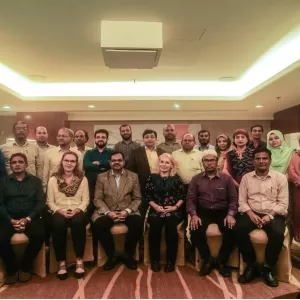Design workshop lays foundation for new training program on food systems governance for sustainable healthy diets in Bangladesh
In February 2024, the CGIAR Research Initiative on Sustainable Healthy Diets through Food Systems Transformation (SHiFT) signed a Memorandum of Understanding with the Bangladesh National Nutrition Council (BNNC) of the Ministry of Health and Family Welfare and the Food Planning and Monitoring Unit (FPMU) of the Ministry of Food, formalizing their shared commitment to advancing the implementation of food systems transformation for sustainable healthy diets in

Design workshop lays foundation for new training program on food systems governance for sustainable healthy diets in Bangladesh
In February 2024, the CGIAR Research Initiative on Sustainable Healthy Diets through Food Systems Transformation (SHiFT) signed a Memorandum of Understanding with the Bangladesh National Nutrition Council (BNNC) of the Ministry of Health and Family Welfare and the Food Planning and Monitoring Unit (FPMU) of the Ministry of Food, formalizing their shared commitment to advancing the implementation of food systems transformation for sustainable healthy diets in Bangladesh.
A key activity of this partnership is the development of a training of trainers (ToT) program to strengthen capacity for food systems transformation. To begin the process of designing the program, SHiFT held a two-day workshop in Dhaka in October 2024. The event brought together over 30 participants, including officials from FPMU and BNNC, as well as representatives from other government ministries, academic institutions, and the private sector. The workshop sought to gather input to tailor training content for Bangladesh and demonstrate participatory facilitation techniques to be used in the ToT program.
Workshop highlights
On the first day of the workshop, FPMU provided an overview of food systems transformation for sustainable healthy diets in Bangladesh. With this context in mind, participants discussed their organizations’ roles in the process. BNNC and FPMU were recognized as leaders in coordinating research, monitoring, and policy development. Academic institutions primarily contribute through research, while other organizations focus on implementing policies and programs.
Discussions identified key topics to cover in the ToT program, such as food systems concepts, nutrition and healthy diets, food systems governance, stakeholder mapping, transformation approaches, and collaboration strategies. Challenges to address included limited capacity, implementation barriers, evidence gaps, political instability, and climate change impacts.
On the second day of the workshop, participants collaborated to design the structure of the ToT program, focusing on training formats, delivery methods, and selection criteria. A phased roll-out was recommended, starting nationally and expanding to the sub-national and community levels. Additionally, participants indicated the need for an official training manual on food systems governance, and emphasized selecting core trainers based on expertise, institutional endorsement, and self-motivation.
Throughout the workshop, participants stressed the importance of the ToT program for strengthening the knowledge, skills, and confidence of food system actors. This capacity development will ultimately contribute to achieving Bangladesh’s food systems transformation goals under the UNFSS Pathway, and more broadly, the 2030 Agenda for Sustainable Development.
Next steps for the ToT program
Moving forward, SHiFT will use the feedback generated during the workshop to refine the ToT approach in Bangladesh. A technical committee will be established to develop the program, including contextualizing the content, identifying collaborators, and producing country case studies. In 2025, an e-Course on Food Systems Governance will be launched in Bangladesh, as well as three online practice sessions. A face-to-face workshop will take place later in the year to organize a follow-up strategy for trainers.
Header image: Group photo from the SHiFT ToT design workshop in Dhaka, Bangladesh; Zubair Hossain Sikder, Student of MA in Economics, Siddheswari College, Dhaka.
The International Food Policy Research Institute and the Alliance of Bioversity International and CIAT lead SHiFT in close collaboration with Wageningen University and Research and with contributions from the International Potato Center. SHiFT combines high-quality nutritional and social science research capacity with development partnerships to generate innovative, robust solutions that contribute to healthier, more sustainable dietary choices and consumption of sustainable healthy diets. It builds on CGIAR’s unparalleled track record of agricultural research for development, including ten years of work on food systems and nutrition under the CGIAR Research Program on Agriculture for Nutrition and Health.

